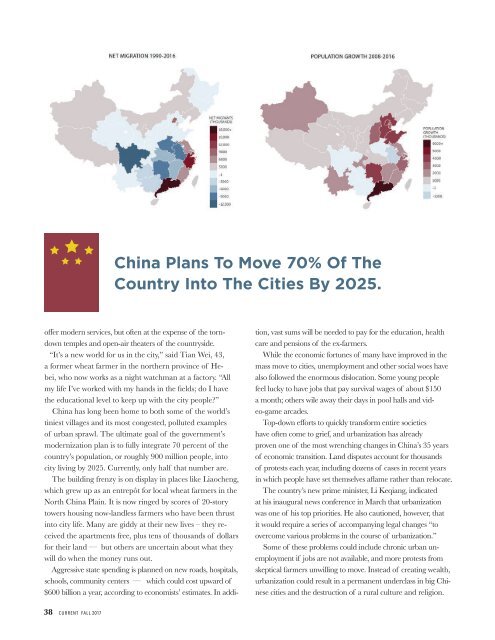Current Magazine
Create successful ePaper yourself
Turn your PDF publications into a flip-book with our unique Google optimized e-Paper software.
China Plans To Move 70% Of The<br />
Country Into The Cities By 2025.<br />
offer modern services, but often at the expense of the torndown<br />
temples and open-air theaters of the countryside.<br />
“It’s a new world for us in the city,” said Tian Wei, 43,<br />
a former wheat farmer in the northern province of Hebei,<br />
who now works as a night watchman at a factory. “All<br />
my life I’ve worked with my hands in the fields; do I have<br />
the educational level to keep up with the city people?”<br />
China has long been home to both some of the world’s<br />
tiniest villages and its most congested, polluted examples<br />
of urban sprawl. The ultimate goal of the government’s<br />
modernization plan is to fully integrate 70 percent of the<br />
country’s population, or roughly 900 million people, into<br />
city living by 2025. <strong>Current</strong>ly, only half that number are.<br />
The building frenzy is on display in places like Liaocheng,<br />
which grew up as an entrepôt for local wheat farmers in the<br />
North China Plain. It is now ringed by scores of 20-story<br />
towers housing now-landless farmers who have been thrust<br />
into city life. Many are giddy at their new lives – they received<br />
the apartments free, plus tens of thousands of dollars<br />
for their land — but others are uncertain about what they<br />
will do when the money runs out.<br />
Aggressive state spending is planned on new roads, hospitals,<br />
schools, community centers — which could cost upward of<br />
$600 billion a year, according to economists’ estimates. In addition,<br />
vast sums will be needed to pay for the education, health<br />
care and pensions of the ex-farmers.<br />
While the economic fortunes of many have improved in the<br />
mass move to cities, unemployment and other social woes have<br />
also followed the enormous dislocation. Some young people<br />
feel lucky to have jobs that pay survival wages of about $150<br />
a month; others wile away their days in pool halls and video-game<br />
arcades.<br />
Top-down efforts to quickly transform entire societies<br />
have often come to grief, and urbanization has already<br />
proven one of the most wrenching changes in China’s 35 years<br />
of economic transition. Land disputes account for thousands<br />
of protests each year, including dozens of cases in recent years<br />
in which people have set themselves aflame rather than relocate.<br />
The country’s new prime minister, Li Keqiang, indicated<br />
at his inaugural news conference in March that urbanization<br />
was one of his top priorities. He also cautioned, however, that<br />
it would require a series of accompanying legal changes “to<br />
overcome various problems in the course of urbanization.”<br />
Some of these problems could include chronic urban unemployment<br />
if jobs are not available, and more protests from<br />
skeptical farmers unwilling to move. Instead of creating wealth,<br />
urbanization could result in a permanent underclass in big Chinese<br />
cities and the destruction of a rural culture and religion.<br />
38 CURRENT FALL 2017





